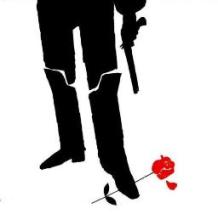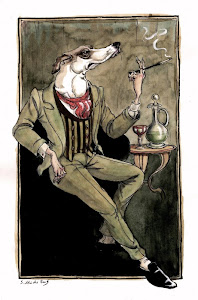 Trevor Myburgh is author of the forthcoming The Hotchkiss Quandary (Castelmann, 2017) and a co-founder of the Tradpunk literary movement. He lives in Brooklyn and works as a free lance writer.
Trevor Myburgh is author of the forthcoming The Hotchkiss Quandary (Castelmann, 2017) and a co-founder of the Tradpunk literary movement. He lives in Brooklyn and works as a free lance writer. Q: Please tell my readers a little about yourself. What experiences have shaped your outlook on literature and life in general? When did you first become interested in writing?
A: I grew up in the Northeast, where literature was part of family life. I attended boarding school and obtained my B.A. in English literature in 1994. I have been influenced by my father, an attorney and a former political prisoner whose access to American and European authors sustained him in captivity. Being reared on books in several languages helped me to complete my university degree and put myself into a wider perspective. For example, I like to speculate as to how my interlocutor or enemy perceives me. This requires a great deal of intellectual effort and emotional detachment. I think that never during my formal educational period did I take anything for granted: no ideology, no system, no belief, no sense of group victimhood. One needs not just to reexamine history; one must first reexamine his often self-serving assumptions. To be honest, my curricular period at college was largely a waste of time. What I was taught was mostly ideologically based drivel delivered by mediocre academics, with remarkably similar freudo-marxophile affinities.
Q: Your new book, The Hotchkiss Quandary, is set in the glittering world of America’s privileged elite, a world of prep schools, Ivy League colleges, country clubs, and wood-panelled banking offices. What are the basic ideas of this book? What was your motivation for writing it?
A: This book is a fictional exploration of a group of young Americans, following their progression through prep school, college, and the Manhattan world of publishing and banking. I am appalled by the dogmatic spirit and bias in higher education, which has for decades been subject to fraudulent scholasticism. I am also shocked by the false meritocracy in the American establishment and by the quota system, which definitely reminds me of the quota system in hiring that was in place in the ex-Soviet Union. The best and the brightest are, as a rule, shoved aside. The modern ideology of the big buck, the dictatorship of well-being, coupled with the false misnomer of "consumerism," destroys all values and all cultures, including our own. I do not blame Europeans, and I reject conspiracy theories. I primarily hold responsible lazy and corrupted academics, the modern media, and politicians who are mortgaging the American future. However, most likely, we need more chaos in our polity, because only out of chaos new literature and a new value system can emerge.
Q: In your book you also paint a grim and gloomy portrait of the future for America and American culture. What are the causes of this catastrophic situation, and what, if anything, can be done to reverse the trend?
A: Unlike many writers, I tend to look critically at the root causes of our approaching death. Was it not the millennium-long belief in one bizarre form of Oriental monotheism, that is, Christianity, along with its modern egalitarian derivatives, that have brought us today to our modern “love thy exotic neighbor” entropy, and self-hate? It seems to me that the only way to stop the process of collective suicide is by discarding the ideology of progress, the myth of egalitarianism, and the theology of market democracy.
Q: Readers may find that hard to digest. How much do readers really “learn” from literature?
A: They never do, because they never bother to learn in the first place. The linear concept of fiction, a currently fashionable notion in post-post-modern academic circles, is a willful act of intellectual stupidity. Literature is always open to new deliriums and hoaxes, but it is also open to new rebirth. The great problem is that many fine people are damaged in the process. I have no illusions about a static genre. After all who says that even in a static paradise we would not experience, after a prolonged bliss, periods of intense boredom?
Q: Do writers no longer play a significant role in American society?
A: They do, but not in the way people assume. I am fascinated by the current disintegration of critical thought. Yesterday writers were the bad conscience of the existing order. Many today have become the good conscience of the established disorder. Prepared to do anything to get some crumbs from the media's cake, they do not realize that they are cutting the branch on which they sit. One should also take into account the divorce between intellectual families and political families. Ideological differences are no longer pertinent when it is a question of describing the content of major books appearing today in The New York Times Book Review. As far as the realm of ideas and the work of thought go, the ideological paradigm seems increasingly to have been replaced by a break between the "center" and the "periphery." The former corresponds to a dominant ideology which is to legitimate the system and the latter includes all those who, no matter what their own itinerary, challenge the axiomatic content of interest and blend of economism, productivism and utilitarianism to which society has led. Fruitful dialogues are possible in this "periphery."
Q: In your writing you tend to place emphasis on what your characters are wearing. How does this reflect your own interest in clothing, and in classic style? Who are your favourite designers?
A: It is acceptable now to be refined. It is acceptable to wear a well-tailored suit again in the evening and in your spare time. The vast movement of techno-economic homogenization, which is eroding individual identities nearly everywhere and is producing a new form of sartorial distress, is fading. Classic style is a principle and has value only as a principle. The cult of fashion is not a response to the real problems of the world but an escape, a mystifying effusion or, worse still, a fearful diversion to internal deficiencies. In which case, the metaphysics of subjectivity remains and it is often only the windbreaker for social egoism. My own style tends towards oblique tailoring.
Q: Your writing is often accused of being derivative of authors as diverse as Fitzgerald, Wodehouse, and Bret Easton Ellis. How valid are these accusations?
A: Facts and fiction are often intertwined in modern writing. And this is likewise true of every writer’s personal mythology. To endure and survive, every writer resorts to his own mythical narrative, no matter how aberrant it may seem to critics and even future generations. Georges Sorel, the French thinker, understood and described that human trait.
Q: To what extent has your response to these critics fostered an interest in the larger issues raised by your books, including the origins and outcome of society, the Ivy League question, and so forth?
A: Throughout the American literary world, the term “literature,” due in part to its semantic imprecision, has now acquired a pejorative meaning, with an undertone of criminality. Many writers refrain from open debate for fear of having their reputations attacked, including seeing their ideas disparaged in quotation marks in hostile reviews, or ignored altogether. Regardless of whether one agrees or disagrees with what certain writers publish, when a country’s judiciary—that is, its thought police—step in, then freedom of speech becomes an empty phrase. What we see is a form of judicial mind control. I do not think that any freedom loving and tolerant man or woman is a priori trying to “deny” or “assert” anything. With the passage of time, some of our ardently held beliefs or conventional platitudes must inevitably be discarded. Fictional events are inevitably bound to be reexamined within new time frames, and in perpetually new causal relationships.
Trevor, thank you very much for the interview! It was very informative.





















9 comments:
The command of the English language portrayed in Myburgh's works as well as the depth of his imaginative and inventive characterizations and even his non-conformist philosophical views which are at times expressed in form of poetic mannerisms, are all of such sublimated refinement that they nearly come close to the level of this BLOG. ;)
v.B.
Great entry, Trad. Nice to see you still have time for the blog post-wedding.
Well done.
"..only out of chaos a new literature and a new value system can emerge."
While I find this idea engaging and stimulating i fear Mr Myburgh overlooks the extent to which 'literature' in the traditional sense is being or even has been supplanted by visual culture, imagery both "real" and manufactured, to the extent it can be difficult to tell the difference between the two.
Since WWII visually driven mass media has accelerated exponentially. The rise of movie making, the arrival of television, the computer and the ways it can be used have given rise to an insatiable demand for images. A prime example is the cult of the celebrity, often spoken of disparagingly, it once relied on achievement and recognition, now it is merely enough to be seen. Until we are taught how to see in the same way people were once taught read and learn, until we learn a new skill set to be visually discerning, to edit out frippery and triviality to evaluate intellectual depth and moral substance we will be encountering a new age of mass illiteracy and with it ignorance.
Maybe Mr Myburgh's next work should take the form of a comic book (manga) and instead of waiting for critical acclaim in the NYT Book Review he should embark on his own publicity campaign by cultivating a serious cocaine addiction involving several failed attempts at re-hab and start behaving atrociously embarking on a series of lurid affairs with Hollywood starlets, preferably two or three at the same time. At least it will give rise to his own personal chaos.
Thanks for this interesting post.
I am curious about the term "thought police". Who are they? What are they? or better, How do they enforce?
Surprising point of view for someone so relatively young.
Mr. Mybug, I mean, Myburgh, sounds like a queer, moody brute, but there's rich soil in here if one cares to dig for it. ;)
Intriguing stuff; good show, LBT.
Having some small literary ambitions myself, and examining the English equivalent of Mr. Myburgh's milieu (public schools, Oxbridge, gentlemen's clubs and the City), I note certain parallels, particularly the increasing prevalence of 'freudo-marxophile affinities' and 'false meritocracy'.
Initials CG, the term 'thought police' originates from Orwell's 'Nineteen Eighty-Four'; perhaps you should read it.
BPF
Benedict, I humbly admit I have not read Orwell's 1984. One of those I just never got around to. Will do.
It's just an observation of mine. I see the term thrown around so much I get the feeling that it has been somewhat become imprecise.
In our modern American society the Thought Police are far more subtle and multifaceted than even Orwell ever envisaged. The press, or if you prefer media, often function in unison to define public consciousness. To what ends, I’m unaware.
This comes to mind due to the recent dreadful happenings in the Republic of Georgia, a conflict in which I do not have a horse. Every source of news but one I’ve encountered has painted this conflict in black and white and as being totally one-sided.
The reality is evidently much more complex with provocations and atrocious behavior on behalf of both combatants and very uncertain historical precedents. This only courtesy of NPR.
Post a Comment